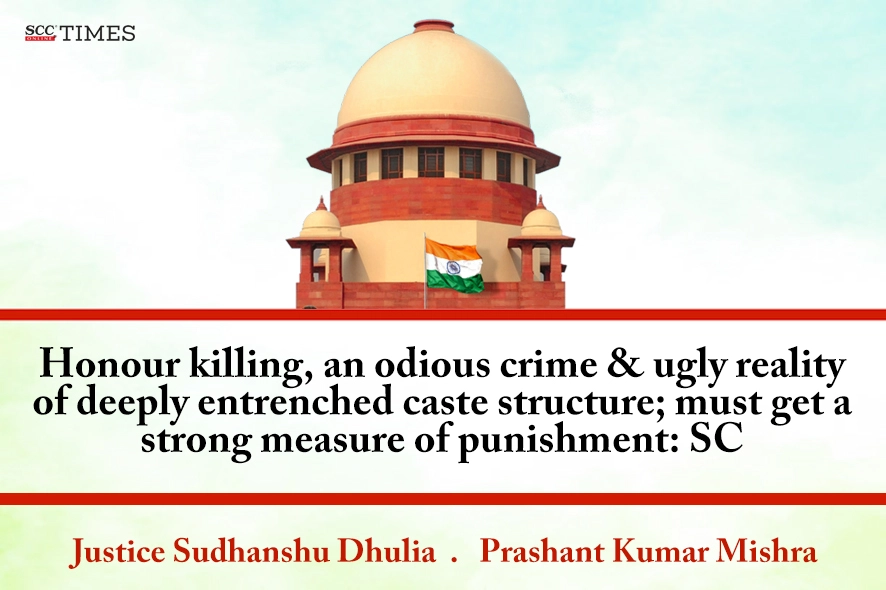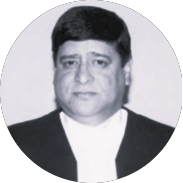Supreme Court: While considering the instant matter, which revolved around honour killing of a young couple via administering poison in full view of a large number of villagers by the deceased girl’s father and brother; the Division Bench of Sudhanshu Dhulia* and Prashant Kumar Mishra, JJ., refused to interfere with the Madras High Court decision on convicting and sentencing the appellants (accused persons). The Court further awarded compensation of Rupees 5,00,000 to the deceased boy’s parents jointly, or to the nearest of their kins. This compensation is liable to be paid by the State of Tamil Nadu, and this compensation would be in addition to the amount awarded or directed to be paid as compensation by the Sessions Court and High Court.
“A crime is an act against the State. But a wicked and odious crime, as the one we have just dealt with, is the ugly reality of our deeply entrenched caste structure. Honour-killing, as these are called, must get a strong measure of punishment”.
Background:
The deceased couple, both in their early 20s, were residents of village ‘Pudukoorapettai’ in District Cuddalore, Tamil Nadu. The deceased girl belonged from the Vanniyar community, while the deceased boy was a Dalit. The deceased couple secretly married knowing that the girl’s family would never allow their union; and they got their marriage registered. After performing their marriage, the two returned to their village and were leading a normal life with their respective families, but then in the first week of July 2003, both left their village quietly without attracting any attention.
The prosecution stated that after searching and finding the deceased boy, the accused persons undressed him, tied him to a post and mercilessly beat him in full view of the villagers; this was done to compel the deceased boy to reveal the location of his wife. After the deceased girl was tracked, the deceased couple were taken to the cashew grove near the village, where the couple were administered and insecticide Nuvacron (poison), thereby killing them. The two bodies were then burnt in different places-the girl in the village cremation ground and the boy at a place nearby. The prosecution alleged that the 2 of the impleaded accused persons, who were police officers, knew about the incident, they visited the crime scene, but did not lodge any FIR.
After a gap of 9 days, when some leaders belonging to the Dalit community raised this issue through media and garnered public support, that a case was finally registered on 17-07-2003. The prosecution highlighted that the questionable manner in which the entire investigation was carried out by the local police, compelled the family of the deceased boy to seek interference from the Madras High Court where a petition was filed with a prayer that the investigation in this case must be handed over to the CBI, which was allowed by the High Court.
A total of 15 accused had faced trial, and the Trial Court ultimately convicted 13 of them. The accused police officers were convicted by the Trial Court under Sections 217, 218 of IPC and Sections 3(2)(i), 4 of the Scheduled Castes/Scheduled Tribes (Prevention of Atrocities) Act, 1989, and both of them were sentenced to life imprisonment.
By the impugned judgment, Madras High Court modified the conviction and sentence of the accused Sub-inspector, acquitting him for offences under Section 3(2)(i) of the SC/ST Act and Section 218 of IPC, but maintaining his conviction for offences under Section 4 of the SC/ST Act and Section 217 of IPC, and thus reducing the sentence imposed from life imprisonment to two years rigorous imprisonment. While the conviction and sentence of the accused Inspector was upheld.
11 accused persons, including the accused Police Officers, approached the Supreme Court, challenging their conviction and sentence.
Court’s Assessment:
Perusing the matter, the Court took note of long and inordinate delay which has been caused in this case, right from the lodging of the FIR, and remarked that it speaks volumes about the gross inefficiency at the hands of the prosecution on the one hand and dilatory tactics employed by the defence on the other hand, which together led to a slow trial. Furthermore, the Court pointed out that many of the prosecution witnesses in this case have turned hostile.
Vis-a-vis evidentiary value, the Court explained that though it is trite and much overstated but the maxim “falsus in uno, falsus in omnibus”, is not applicable to our criminal justice system. It is for the Court to distinguish the wheat from the chaff while dealing with the depositions of a hostile witness. Courts can rely upon that part of the deposition of a hostile witness which is corroborated by other evidence on record. If part of the evidence of a hostile witness corroborates with other reliable evidence, then that part of the evidence is admissible. Once a prosecution witness has been declared hostile and then cross-examined by the prosecution, then it is for the Court to evaluate the veracity of the testimony. There can be several reasons for a witness to turn hostile, and the court must also look into these factors while evaluating the evidence given by a hostile witness. “It is an uncomfortable reality in our criminal Courts for a prosecution witness to turn hostile. But then the purpose of a Trial Court is to go to the truth of the matter. Whatever evidence is there before the Court must be examined, tested, corroborated (whenever necessary), before a verdict can be finally given”.
The Court pointed out that one of the many reasons for witnesses turning hostile is the long delay usually caused in a trial. The instant case is no exception. Here, the incident occurred in the year 2003, the case was committed to Sessions in the year 2010 and charges were framed as late as in the year 2017, and the judgment was finally pronounced by the Trial Court on 24-09-2021. “It took eighteen years!”.
The Court further pointed out that the role played here by the accused in delaying the trial cannot be discounted. The records also reveal that the depositions of most of the prosecution witnesses were recorded only towards the end of the year 2017. Moreover, CBI in this case had filed its charge-sheet, inter alia, against two persons belonging to Dalit community (A-4 and A-9). Although, these two were finally acquitted by Trial Court as there was absolutely nothing against them, but in the process, prosecution had to declare many of its witnesses belonging to the Dalit community as hostile simply because these witnesses did not depose against A-4 and A-9. “It is also clear now, in any case, that these two were wrongly made accused by the prosecution. All the same, the benefit of such witnesses turning hostile cannot be given to other accused who were found involved in the offence, on the overwhelming weight of other evidence”.
Vis-a-vis related and interested witness, the Court said that it is a settled position of law that the Court cannot ignore the testimonies of witnesses only because they are close relatives of the victim. In cases where the crime is committed at the residence or a place near the residence of the deceased, it is the close relatives who are likely to be a witness to the crime. They are natural witnesses.
Perusing the testimonies of the prosecution witnesses in the instant case, the Court noted that the case mainly depended on the on the testimony of PW-49, who is the stepmother of the deceased boy, and an eyewitness. She was the most important witness, as she has seen the macabre act of the actual poisoning of the two innocent lives.
Discussing Section 311 of the CrPC, under which PW-49 was summoned as a witness, the Court explained that there is a wide discretion with the Courts under Section 311 of the CrPC. These powers can be exercised suo moto or on an application moved by either side. After all, the object is that the Court must not be deprived of the benefit of any valuable evidence. It is absolutely necessary that the Court must be apprised of the best evidence available. Thus, Courts have been given wide powers to decide on their own if a witness is required to be called or recalled for examination or re-examination. This power under Section 311 of the CrPC can be invoked at any stage of the trial, even after the closing of the evidence. Section 311 can also be read along with Section 165 of the Evidence Act, as the powers of the Court under Section 165 of the Evidence Act are complementary to Section 311 of CrPC.
The Court further pointed out that the Courts are not barred from putting questions which may contradict the witness with the previous statements made before the police. The special powers of the Court under Section 165 of the Evidence Act are not impaired or controlled by the provisions of Section 162 of the CrPC.
Perusing the findings of the Court vis-a-vis the accused police officers, the Court noted that the police station, where these two officers were posted and which has the jurisdiction of the village, is not very far from the village in any case as noticed by the High Court. The Court remarked that was very difficult to believe that a dastardly double murder takes place in the village, and those incharge of the police station remain unaware of the crime. To the contrary, it has come in the evidence that the police refused to lodge the FIR against the accused villagers belonging to the Vanniyar community, when the incident was reported by a Dalit (PW-49) and casteist slurs were hurled on the informants. The Court also noted that the investigation done by the local police itself was motivated and downright dishonest, where the intention was to show that the crime was jointly committed by the Vanniyar and Dalit community. It puts the perpetrators and the victim together as accused. The local police even named the father of the deceased boy as one of the accused, which was a ruse.
The Court pointed out that the purpose of an investigation, like the purpose of a trial, is to reach to the truth. The duty of an Investigating Officer is to lawfully collect evidence. In the present case, the Investigating Officer (A-15) not only covered evidence but fabricated his own. Instead of collecting evidence, he created evidence and tried to implicate the innocent and set the guilty loose. “In order to fulfil his wicked design, he has deliberately and wilfully violated the mandate of Sections 154 and 157(1) of CrPC as well as Section 23 and 24 of the Police Act, 1861”.
The Court thus said that there is no doubt that A-14 and A-15 had the information regarding the death of couple on the day of the incident itself. However, they did not register the FIR, thereby acting in violation of the provisions of law. Their defence that nobody came forward to lodge a complaint for registration of FIR cannot be accepted for two reasons- Firstly, when members from the deceased boy’s family went to the police station to register an FIR, they were rebuffed and were given caste-based abuses. Thus, their plea that nobody came forward to lodge a complaint is unsustainable in light of the facts of the case. Secondly, even if nobody went to the police station to report the double murders, it was the duty of A- 14 and A-15 to register the FIR as it cannot be doubted that they had information regarding the crime.
Therefore, the Court concluded that the Madras High Court rightly held the accused police officers to be guilty under Section 217 of the IPC and Section 4 of the SC/ST Act as they neglected their duties and disobeyed the law by not registering the FIR at the first instance with the intention to save the culprits. Furthermore, A-15 was in-charge of the investigation which led to the filing of the chargesheet against the innocent persons belonging to Dalit community. There is no doubt that A-15 did this entire exercise to absolve culprits belonging to the Vanniyar community of their complicity in the crime, and he knowingly and deliberately falsely implicated some of the Dalits in an offence punishable with death. A-15 manufactured the extra-judicial confessions and evidence and thereafter, filed the chargesheet against Dalits on the basis of that evidence. Hence, the High Court rightly upheld the conviction of A-15 under Sections 217, 218 of IPC and Sections 4, 3(2)(i) of the SC/ST Act and the sentence of life imprisonment.
Therefore, the Court deemed it fit to decline any interference in the decision of the High Court and directed the State to pay compensation to the kin of the deceased boy. The Court further directed that all those appellants who are on bail, should surrender within 2 weeks to undergo their remaining sentences.
CASE DETAILS
|
Citation: Appellants : Respondents : |
Advocates who appeared in this case For Petitioner(s): For Respondent(s): |
CORAM :






